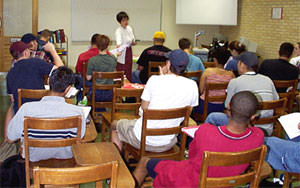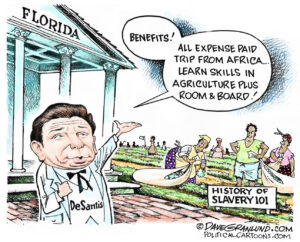Paul Cummins: Fighting the Wrong Battles in Education Reform
The co-founder of the trailblazing Crossroads and New Roads schools in Santa Monica argues that if we can?t fund cuts in class sizes and improve educational resources, nothing else we do will matter a whit.
The co-founder of the trailblazing Crossroads and New Roads schools in Santa Monica argues that if we can?t fund cuts in class sizes and improve educational resources, nothing else we do will matter a whit.
For too many years now, we have allowed the wrong issues to dominate the debate over the reform of public education.
We are too caught up in questions of who will control the schools and how we implement our obsession with testing; we pay far too little attention to improving the content of what we teach and finding new ways to fund that teaching.
Most of the current public debate centers on issues like the power struggles among mayors, unions and boards of education; arguments over centralized versus decentralized authorities; and the quest to raise scores on standardized tests. The tunnel vision focused on these criteria, however, will continue to produce students who are intellectually inept, virtually illiterate, bored, oblivious to world issues, uninterested in global warming or nuclear proliferation or overpopulation — but if they can raise their test scores by a few percentage points, then all will be well.
Whether the mayor or the superintendent has the ultimate authority is less important, I believe, than the conditions in which teachers teach and the content of what their students are asked to learn: It is possible, in overcrowded classes, to force-feed students enough regurgitable information and to administer enough practice tests to raise test scores some. But it is not possible, in overcrowded conditions, to really teach — to have dialogues; to attend to individual differences; to carefully read, correct and return essays; to get to know your students. For an English teacher who has five or six classes a day of 35 to 50 students per class, it matters not a whit whether the mayor, superintendent or board is calling the shots.
Furthermore, if the classroom teachers are so bound to teaching-to-tests, then the real values and critical issues of our time will go unattended.
So what do we do? The problem is that a generation of dumbed-down products of this current system is out on the streets and doesn?t even recognize the importance of the issues I am raising. Test scores are a form of educational materialism, and a test-score mentality is easily absorbed into a consumerist society. The pursuit of grades flows nicely into the pursuit of dollars. Consequently, we don?t have a lot of outrage about educational or social justice coming from those who are doing well financially. For seven years now we have had a Congress that awarded itself raises while voting down minimum-wage increases for the poor. The outrage? Very little on either side of Congress. And when liberals like me suggest tax increases to fund education properly, I am met with deafening silence or outright hostility (Editor’s note: Seattle Mayor Greg Nickels applauded a court’s rejection of an initiative to fund schools through a property tax hike. He called this idea “absurd.”)
Why tax increases at all? Because we are not funding education appropriately; to do so would require more revenue, and government derives its revenue primarily from taxation.
?So what would you do to improve our schools?? I am often asked. For starters, I would:
1. Cut class size by half, which would necessitate 2. hiring 100% more teachers, whom I would 3. attract by increasing teacher pay by at least 25%, and I would 4. clean up, repair, remodel and make classrooms attractive and campuses functional.
I would even be so impertinent as to suggest spending some of the congressional largesse on our inner-city schools. Quality private schools spend approximately $25,000 per pupil; inner-city public schools spend between $4,500 and $9,000. Yet California is willing to spend $37,000 per prisoner in the state?s penal system. Such values are upside down.
Whatever the nation does will require millions and ultimately billions of dollars. But we are spending at least $150 million a day in Iraq and have spent more than $300 billion waging war on a country that did not attack us. So clearly the money is there — when the beneficiaries are corporations, the military or industrialists.
Even leaving that argument aside, however, we have the funds. My soon-to-be-published book, ?Two Americas/Two Educations,? will outline where these funds are, and my next column at Truthdig will summarize how we should apportion them. What we lack is leadership and resolve.
Paul Cummins is executive director of the New Visions Foundation, a nonprofit organization that seeks to catalyze change in American public education.
Cummins co-founded Crossroads School (Santa Monica, Calif.) in 1971, the Crossroads Community Foundation in 1991 and New Roads School in 1995, and was a co-creator in launching Camino Neuvo Charter Academy.
Cummins holds degrees from Stanford (BA), Harvard (MAT) and the University of Southern California (MA, PhD), and he taught English at Harvard School and the Oakwood School in California as well as at UCLA.
He is the author of several books, including “Proceed With Passion: Engaging Students in Meaningful Education” (Red Hen Press, 2004).
Your support matters…Independent journalism is under threat and overshadowed by heavily funded mainstream media.
You can help level the playing field. Become a member.
Your tax-deductible contribution keeps us digging beneath the headlines to give you thought-provoking, investigative reporting and analysis that unearths what's really happening- without compromise.
Give today to support our courageous, independent journalists.






You need to be a supporter to comment.
There are currently no responses to this article.
Be the first to respond.